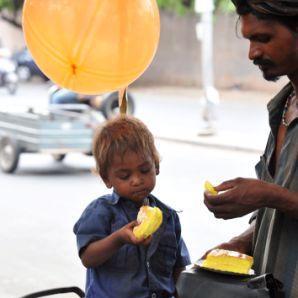
New Delhi, November 3: Private companies have hijacked the government's flagship scheme to provide food to poor children and their mothers, the Integrated Child Development Scheme (ICDS), with contractors in Maharashtra alone controlling Rs 1,000 crore worth of supplies in contravention of Supreme Court orders, a report of the SC commissioners office has said.
The SC orders bar contractors from supplying rations under the scheme. It only permits village communities, self-help groups and mahila mandals to buy grains and prepare food for children.
The commissioners' report, submitted to the court on Friday, warned that the contractor-corporate lobby had a firm grip over ICDS rations supply business, worth Rs 8,000 crore, in several states. It specifically referred to Karnataka, Uttar Pradesh and Meghalaya, besides Maharashtra.
Detailing Maharashtra's case, the report said private companies had floated fronts in the names of 'mahila mandals' or women's organizations to corner the lucrative Rs 1,000 crore annual supply of rations.
The ICDS is India's primary social welfare scheme to tackle malnutrition and health problems in poor children below 6 years of age and their mothers. It is considered the backbone of government's efforts to improve the dismal family health indices in India - some of the worst even among developing countries.
The commissioners recommended that an independent investigation be conducted under the apex court's supervision to investigate the possible nexus "between politicians, bureaucrats and private contractors in the provisioning of rations to ICDS, leading to largescale corruption and leakages".
The report, prepared by the principle advisor to the commissioners, said the Maharashtra chief minister had been made aware of the scam by the commissioners as well as the National Commission for the Protection of Child Rights. They said the fact that the corrupt system continued unchecked showed the "level of influence" the contractors had over the "levers of power in Maharashtra".
This report lays bare the modus operandi companies used to corner the lucrative contracts in Maharashtra. The state government first changed its rules in 2009 to allow not only community-based organizations but also 'women's institutions' to bid for the supply - a loose enough term to permit any contractor, company or agency with women on board to bid for the contracts.
Only three of these 'women's institutions' got contracts for the entire state's ration supply which is worth over Rs 1,000 crore annually. None of these three mahila mandals - Venkateshwara Mahila Audhyogic Sahakari Sanstha, Mahalaxmi Mahila Grhaudyog & Balvikas Buddhesiya Audhyogic Sahakari Sanstha and Maharashtra Mahila Sahakari Grahudhyog Sanstha Limited -- had any production capacity of their own.
The three mahila mandals each formed sub-committees with select members handling complete control of administration, finances and operations of the organizations. The sub-committees then gained legitimacy by directly contracting with the state government, securing bank guarantees as well as opening separate bank accounts.
The sub-committees went on to contract five companies to supply the rations. But the members on board these sub-committees were all relatives of the owners of the five companies.
In other words, the companies had formed shell agencies to bid for the contracts on the pretext of being community-based women's organizations.
Venkateshwara formed two sub-committees. One sub-committee farmed out contract to Swapnil Agro Limited owned by Ulhas Pagariya. The sub-committee comprised Pagariya's wife and two relatives. The second sub-committee gave a contract to Paras Agro Private Limited, with one Satishrao Munde as managing director. Munde's wife and daughter comprised the sub-committee.
Similarly, Mahalaxmi formed three sub-committees giving out contracts to Indo Allied Protein Foods run by Rajan Shankar Jadhav, Sai Food and Sai Food Products owned by Pradip Auradkar and Sanjay Auradkar and Kota Dal Mill based in Rajasthan.
Maharashtra Mahila Sahkari, which is actually a company and not a society with Rama Agrawal as vice-chairman, gave the contract to Sagar Foods run by her father-in-law Prabhudayala Agarwal.
The principle advisor to the court commissioners, Biraj Patnaik, refused to comment when contacted.
His report said lab reports testing the quality of food grains supplied was also suspect as all three mahila mandals went to the same private lab but government testing found the food lacking. The report said media had earlier highlighted how the ration was of such bad quality that it was at times sold as cattle feed and many times, fungi and termites were found in them. A case on the matter is being heard in the high court as well.
The author added that the report should be seen as a preliminary inquiry and not a comprehensive indictment of the parties. They have asked for court directions for an independent authority carrying out an investigation. The apex court gave the state the opportunity to respond to the report and posted the next hearing for November 23.






Comments
Add new comment